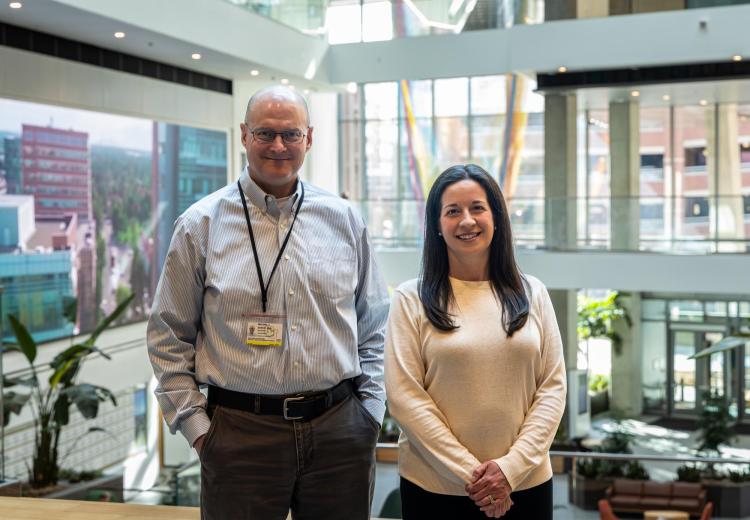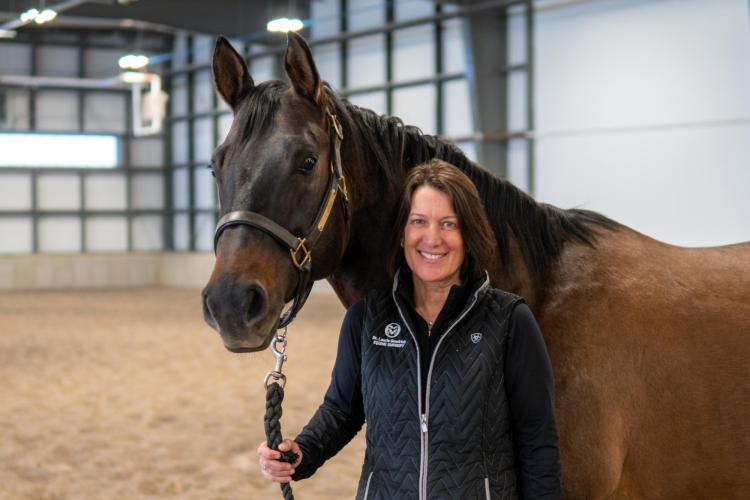Imagine a day when joints could heal themselves.
At the first inkling of a creaky knee, patients could get a single shot in the joint that would not only stop their cartilage and bone from eroding, but kick start its regrowth. In more advanced cases, that shot might also deliver a biomaterial repair kit to patch holes in tissue. If multiple joints ached, an annual IV infusion could ferry regenerating therapies to all of them at once.
This may seem like a dream to the 32.5 million people who suffer from osteoarthritis. This week, the Advanced Research Projects Agency for Health (ARPA-H) awarded up to $39 million to a University of Colorado Boulder-led team of scientists to work toward making it a reality.
The Novel Innovations for Tissue Regeneration in Osteoarthritis (NITRO) program was the first created under ARPA-H, a new federal agency to support "high-impact solutions to society's most challenging health problems."
With the cash infusion, a dream team of engineers, medical scientists and veterinarians from CU Boulder, the CU Anschutz Medical Campus and Colorado State University can make an aggressive final push toward a goal many have spent their entire careers pursuing.
"Within five years, our goal is to develop a suite of non-invasive therapies that can end osteoarthritis," said project leader and Principal Investigator Stephanie Bryant, PhD, professor in the Department of Chemical and Biological Engineering, Materials Science and Engineering, and the BioFrontiers Institute at CU Boulder. "It could be an absolute game-changer for patients."
An epidemic without a cure
Osteoarthritis is the third most common disease in the U.S. and affects roughly one in six people over age 30 worldwide.
The disease causes cartilage-the buffering tissue that keeps bones from grinding together-to decay. Over time, bone is damaged too, which reshapes the joint and results in movement becoming painful.

Co-Principal Investigators Michael Zuscik, PhD, professor and research vice chair in the Department of Orthopedics and Karin Payne, PhD, associate professor of orthopedics at CU Anschutz (Photo by Ryan Wuller/CU Anschutz)
Age and obesity increase risk, and rates are on the rise as the U.S. population ages and grows more sedentary. At present, patients are generally limited to two options: Treat the pain and, when that is no longer adequate, surgically replace the joint. There is no cure.
"To truly address osteoarthritis, you have to get at both the biology and the structural problem," said co-Principal Investigator Michael Zuscik, PhD, professor and research vice chair in the Department of Orthopedics at the Anschutz Medical Campus. "This unique Colorado dream team we have put together has the multidisciplinary expertise, and now the resources, to tackle both at once. We can approach curing the disease like never before."
Zuscik spent 15 years developing and testing a drug that addresses the biology, nudging both cartilage and bone cells to produce proteins needed to rebuild. While promising, it must be injected every day.
Meantime, Bryant, a materials scientist, has worked for 26 years to develop three-dimensional gel-like biomaterials that can slip into the cracks of torn cartilage or worn bone, providing supportive scaffolding-like the joists of a new building-for the body's own cells to migrate to.
And scientists at CSU have been working for years to perfect gene therapy techniques aimed at controlling inflammation and hastening cartilage healing.
The team now faces an engineering challenge-to devise methods to deliver these technologies to the body together, in a way that provides lasting benefit and treats multiple joints at once if needed.
A one-shot medical breakthrough
To that end, the team is developing nanoparticles that could be administered intravenously, serving as Trojan horses that migrate to inflamed sites and deliver a regenerative medicine cocktail that enables joints to heal.

Co-Principal Investigator Laurie Goodrich, DVM PhD, a veterinary clinician scientist and director of the Orthopaedic Research Center at Colorado State University's Translational Medicine Institute (Photo courtesy of Goodrich)
The team hopes to ultimately commercialize three innovations: a healing shot, an injury-patching hydrogel, and an annual infusion for systemically treating osteoarthritis.
When it's time for trials, co-Principal Investigator Laurie Goodrich, DVM PhD, a veterinary clinician scientist and director of the Orthopaedic Research Center at CSU's Translational Medicine Institute, will lead the charge in animals.
"CSU's expertise in veterinary medicine will play a crucial role in helping to move this science to the next step," said Goodrich. "It's humbling to be a part of it."
However, it's not enough to simply develop such treatments, said Co-Principal Investigator Karin Payne, PhD, associate professor of orthopedics at CU Anschutz.
"At the core of this, the goal is to develop a therapy that's going to be available to all Americans, not just a privileged few," Payne said, noting that researchers will include a demographically diverse group of study participants and minimize cost to make the treatments as affordable as possible.
Early collaborations between team members were catalyzed by AB Nexus, which provides internal funding and resources to support partnerships between CU Boulder and CU Anschutz.
The Colorado team is one of five performer teams to receive an award in the NITRO program.
"This is one of the most debilitating diseases there is and leads to people not being able to work or do the things they love," Bryant said. "The resulting lack of exercise increases the risk of other problems like heart disease. For us to have a chance to improve people's lives-it's the opportunity of a lifetime."






